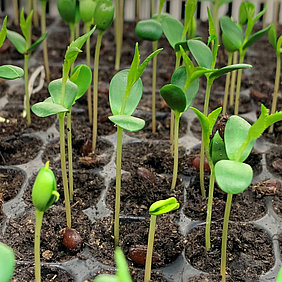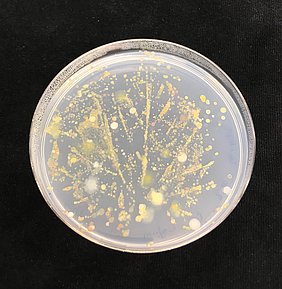What defines us and other living organisms more strongly: genes or the environment? Only recently, researchers were able to prove experimentally that even microorganisms can be inherited from one plant generation to the next via the seed. In an article just published open access in the journal Trends in Microbiology, scientists examine the process of microbial inheritance via the seed in more detail and identify factors that significantly influence the assembly of the plant microbiome. With their basic work, the authors create an important milestone of microbiome research.
Experimental studies suggest that plants not only inherit genetic traits with their seeds, but also a complex microbiome consisting of fungi, bacteria and archaea.
"The knowledge of microbial inheritance opens up the possibility for researchers worldwide to develop a whole new understanding of the natural world and expand our ability to influence it. Plant microbiomes have a huge impact on plant health, resistance, growth and even nutrient uptake. Unfortunately, we know very little about how these communities of microorganisms find their way from one plant generation to the next,” says Dr Ahmed Abdelfattah, group leader on Microbiome Management at the Leibniz Institute for Agricultural Engineering and Bioeconomy and first author of the publication. In 2021, he and a team of scientists were able to experimentally demonstrate microbial inheritance via the seed for the first time.
He therefore took a closer look at microbial inheritance in plants together with his colleagues from Stockholm University, Graz University of Technology and Potsdam University. In their paper, they divide the inheritance process into three stages: from plant to seed, seed dormancy and seed to seedling and shed light on the factors affecting the microbial transmission in each stage.
In the first stage from plant to seed the plant species, its environmental conditions during seed maturation and its reproductive form are among the central influencing factors. In the second stage the type and the design of seed dormancy, among other factors, play a central role as the microbiome of seeds that have to be stored temporarily behaves differently from the microbiome of a seed that naturally rests before it begins to germinate. During germination, in turn, the microorganisms have to find their way into the appropriate plant tissue, where transmission pathways but also genetic factors could be important.
“If we understand how microbial inheritance works and how we can influence it, there is enormous potential for applications. This knowledge could help restoring ecosystems and optimizing agriculture by, for example, transferring beneficial microorganisms to seeds through coating or by incorporating the microbiome into storage conditions or work processes,” concludes Abdelfattah.
Original publication (Open Access):
Ahmed Abdelfattah, Ayco J. M. Tack, Carolina Lobato, Birgit Wassermann, Gabriele Berg (2022): From seed to seed: the role of microbial inheritance in the assembly of the plant microbiome. Trends of Microbiology (https://doi.org/10.1016/j.tim.2022.10.009)
Contact:
Dr. Ahmed Abdelfattah - Leader of working group Microbiome Management
Tel.: 0331 5699-123, E-Mail: aabdelfattah@atb-potsdam.de
Jessica Lietze - Public relations officer
Tel.: 0331 5699-819/-820, E-Mail: presse@atb-potsdam.de
The Leibniz Institute for Agricultural Engineering and Bioeconomy is a pioneer and a driver of bioeconomy research. We create the scientific foundation to transform agricultural, food, industrial and energy systems into a comprehensive bio-based circular economy. We develop and integrate techniques, processes and management strategies, effectively converging technologies to intelligently crosslink highly diverse bioeconomic production systems and to control them in a knowledge-based, adaptive and largely automated manner.
We conduct research in dialogue with society - knowledge-motivated and application-inspired. www.atb-potsdam.de


